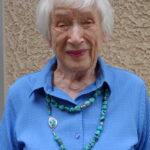
Victoria Messina, z"l (Russia)
I was born in Moscow, Russia, on March 5, 1923. My mother, Kreina Fish, came from a little shtetel, Kurilinoe, in Belarus. She was the youngest child and the only girl of ten children. There is a family rumor that my mother’s eight brothers managed to escape to France in the early 1930s. I certainly hope so. The times were such that we never tried to find them.
My father, Noy Tsitrin, was from Ukraine and worked at a University as an economist. Mother divorced him in 1929, when I was six. In 1937, my father was arrested on the charge of being an “enemy of the people” and spent the next 10 years in the Gulag. I remember him being released in 1947 when I was finishing medical school. All those years, mother helped him by sending money and parcels of clothing and food when it was allowed.
Mother remarried soon after the divorce. Her new husband, Max Mikhelman, became my beloved father, and his two sons, David and Victor (10 months and five years younger than me), my brothers.
Max came from a Jewish sector in Warsaw, Poland, in 1914. He was a paid tutor to a rich man’s son, spoke four languages, had extensive knowledge of Latin, and was very good at math. They made an exception for him (he was Jewish) to study medicine at Moscow University.
Max became an orthopedic surgeon, a brilliant man and a loving father. His only connection with his own family was his older brother Daniil whom he adored. Daniil had quite a different life; he became a professional revolutionary, took an active part in the 1917 revolution, was arrested and shot in 1937 as an “enemy of the people.” I remember shortly after his arrest that his wife told my mother in all seriousness that she couldn’t believe that she had been living so long with an “enemy of the people.” She herself was arrested shortly after but survived. Max never forgave her for that statement and he never spoke to her again.
My school years were full of happy memories. We were very busy building communism. Money was tight, but we were never lacking necessities. Max worked three jobs and was extremely busy. Mother learned how to do facials; she would make and sell terrific facial creams to help make ends meet. I can’t believe that I never learned how to do these things from her.
The only thing I ever wanted to be was a doctor, a surgeon like my father. After I graduated high school in June of 1941, I was accepted to medical school. But, on June 22, World War II began in the Soviet Union. All the boys from school left for the front, though only a few returned.
In October 1941, the Germans were at the outskirts of Moscow. There was panic in the city as they bombed us nightly, and my mother, me, and Victor evacuated to Uzbekistan.
Max remained in Moscow with the hospital, then served in the Army as chief surgeon. He served at the field hospitals all the way from Moscow to Berlin as our army pushed the Germans back. He was an amazing man whose legendary stories were told by his patients many years later. Like many others, Max never talked about those years. Why didn’t I ask more questions? My brother David evacuated with the Aviation Institute he was at.
We ended up in Samarkand, a ancient town in middle Asia, with a lot of other families. I transferred to a local medical school and went to work as a nurse at evacuation hospital number 1269. I learned how to stay awake for three days at a time there. I would go to school in the morning, then work the night shift at the hospital and back to school next morning. I got paid a little money, which we used to buy bread. Later, when a severe food shortage started, I would get a bread card, which was the only way to buy bread and to feed mother and Victor, who was often sick. I contracted malaria as well, which complicated matters. I learned many medical skills under pressure because we were deluged with patients, and there were not enough personnel to care for them. I had wonderful teachers who were themselves under enormous pressure to instruct and deliver patient care at the same time. While I was there, I met one of the boys from my school. He was a fighter pilot and was shot down. I took care of his gunshot wounds.
In 1944, I returned to Moscow, where my studies continued. Upon graduation I went to Karelia, on the border of Finland, where I practiced general surgery for eight years. I was also responsible for the regional blood transfusion station. Once, I jumped with a parachute into a snowed-in tiny town to operate on a woman with appendicitis.
I got married and had my daughter, Natasha. To help make ends meet, I donated blood on a regular basis for extra income.
When I returned to Moscow in 1958, I trained as a plastic surgeon and worked with children with congenital deformities, performing reconstructive surgery following trauma.
I worked very hard all my life. Being Jewish hindered opportunities for career advancement, but I still achieved a lot. I was almost always optimistic, and was always surrounded by a group of lifelong friends.
My daughter and granddaughter came to the United States in 1991 as refusniks. I joined them in 1996, and now Tucson is my home.
